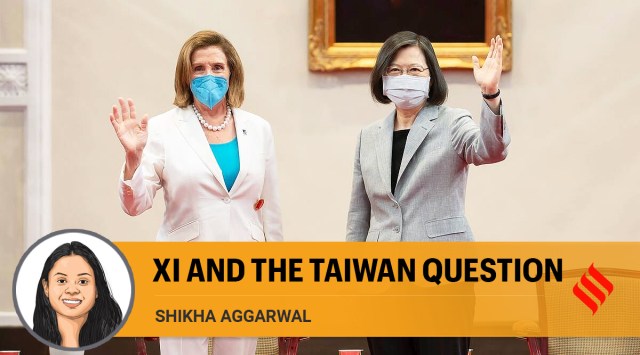
Few events in international politics better exemplify the volatile cocktail of geopolitical contestation, competing nationalisms, and domestic political compulsions than the recently-concluded visit of the Speaker of the US House of Representatives, Nancy Pelosi, to Taiwan. While the US and Taiwan acted as per the democratic rationale of their polities, China’s actions had to follow the diktats of its communist system.
The Party-state established by the Communist Party of China (CCP) in 1949 was premised upon a “social contract”, albeit with CCP characteristics, with the Chinese people. This contract underpins the party’s legitimacy within the Chinese body politic. Therefore, it is as much a survival strategy by the CCP as it is a governance technique. As the Party evolved from a revolutionary entity to a governing establishment, this contract too transformed — the lofty romanticism of “liberation” was replaced by the imperatives of “peaceful development”. Today, this socialist utopia is defined by the “national rejuvenation” ideal. Interestingly, the Taiwan question remained a constant feature of the various avatars of this contract.
Though an old political jargon, national rejuvenation under Xi Jinping is the clarion call of a civilisational state and not merely a cherished ideal of a republican experiment or Communist state. In this version, national rejuvenation is both flexible in its ideological scope and expandable in its territorial ambitions. Importantly, the nationalist rationale of the rejuvenation construct is not sourced from narratives of victimhood suffered during the “century of humiliation”; it is located in the glory of an imagined past, and is thereby both more assertive and aggressive in its orientation.
In addition to being a nationalist project, national rejuvenation is equally a personal investment by Xi. Successful reclamation of every entity and ideal that belongs to the landscape of “rejuvenation” could seal his position as the leading figure within the CCP pantheon. Therefore, China’s increasing bellicosity towards Taiwan needs to be located within the dynamics of CCP’s political expediency, Chinese nationalism, and Xi’s ambitions.
While Pelosi’s visit was not a first by a US House Speaker, the logic of “rejuvenation” politics warranted a belligerent response from the Chinese side — regimes that aspire to claim the pre-eminence of antiquity cannot be perceived as compromising on their “core interests”, either by a domestic audience or the international community. In this paradigm, any act that facilitates Taiwan’s recognition as a political entity is anathema as it violates the spirit of national rejuvenation, and, thereby, the contract between the CCP and the Chinese people.
Though the visit and its effect on US-China relations have implications for Xi’s leadership, they do not necessarily impact his plans for the upcoming 20th Party Congress. While there are sources of criticism and dissatisfaction with Xi’s foreign and economic policies within the higher echelons of the CCP, the Chinese president has meticulously invested his last two terms in dominating the institutional framework of both the Party and state. Therefore, there is limited scope for any elite dissatisfaction to take the form of an effective opposition against Xi in the immediate future.
Further, the democratic logic of a direct correlation between policy criticism, fluctuating public opinion and the prospects of a leader cannot be extrapolated upon the Leninist structure of the CCP in its entirety. The Central Committee that will choose China’s next leadership line at the 20th Party Congress will have the highest number of delegates from the provincial party committees. As mentioned in an earlier article (‘Extraordinary Power of Xi, IE, June 15), most of the newly-elected provincial party chiefs hold work experience in provinces where Xi earlier served as the party chief. Furthermore, the delegates from all contingents shall be indirectly vetted by the Organisation Department which is headed by Chen Xi, a long-time confidant of the President.
While Xi’s prospective third term appears to be largely immune from the visit, he might have to confront some serious criticism from the party elders at the upcoming CCP meeting at Beidaihe. This criticism could be most serious on two substantive points in Pelosi’s address at the Presidential Office. Pelosi referred to “self-determination” as one of the core values of US-Taiwan relations. And as highlighted by a retired senior Indian diplomat, she used the formulation “the people of Taiwan” instead of “people on Taiwan” as mentioned in the Taiwan Relations Act. The significance of this departure in diplomatic parlance will not be lost on the Party elders.
Since the Taiwan question is intrinsically intertwined with the legitimacy of the CCP, and Xi’s personal agenda, China will not launch an outright war until the military balance favours the US. Moreover, with an almost-guaranteed third term, there is limited utility for any war over Taiwan for Xi at the moment.
At the same time, the strategic community needs to take cognisance of the non-military methods being professed by the Chinese leadership and academia to realise the goal of national rejuvenation and, thereby, the resolution of the Taiwan question. A noteworthy development was the Central Conference on United Front Work (UFWD,) held from 29-30 July. At this conference, Xi urged the UFWD to develop an action plan to foster pro-unification sentiments within the Taiwanese public, businesses and intelligentsia.
As the CCP marches ahead with its imperialist project to subsume Taiwan, the Taiwan question shall continue to remain the defining feature of international politics in the years to come.
Aggarwal is a Senior Fellow at India Foundation. She is currently based in Taipei as a Visiting Fellow at the National Chengchi University. She is also a Huayu scholar at NTNU